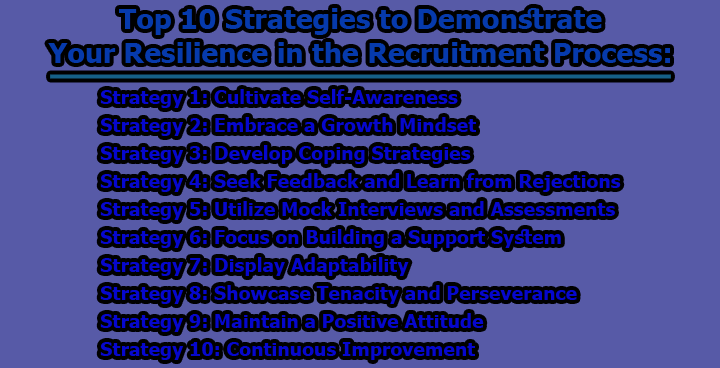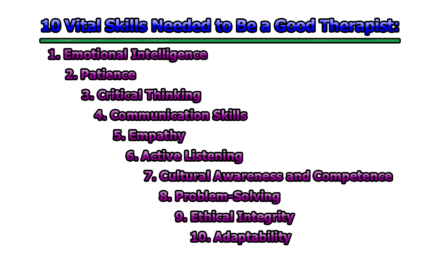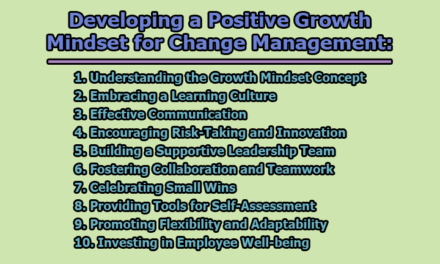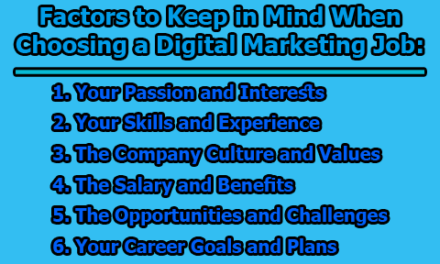Top 10 Strategies to Demonstrate Your Resilience in the Recruitment Process:
The recruitment process can be an arduous journey filled with challenges and uncertainties. As job seekers, it is vital to showcase not only our skills and qualifications but also our ability to persevere in the face of adversity. Employers highly value resilience, as it demonstrates a candidate’s capacity to adapt, overcome obstacles, and maintain a positive attitude even in the most demanding situations. In this article, we will explore the top 10 strategies to demonstrate your resilience in the recruitment process. From self-awareness and stress management to practical preparation and continuous improvement, these strategies will empower you to showcase your resilience in the best possible light. By mastering these techniques, you will be better equipped to navigate the recruitment process with confidence and poise, ultimately increasing your chances of landing the job you desire.
Strategy 1: Cultivate Self-Awareness:
Resilience starts with understanding yourself. Take time to introspect and identify your strengths, weaknesses, and areas of vulnerability. Recognize how you typically respond to stress and challenging situations. By being self-aware, you can proactively address potential triggers and develop effective coping mechanisms. Engage in activities like journaling or self-reflection exercises to gain insights into your emotional responses and behavioral patterns. Armed with this knowledge, you can confidently navigate the recruitment process with a heightened sense of self-awareness.
Strategy 2: Embrace a Growth Mindset:
A growth mindset is a belief that intelligence and abilities can be developed through dedication, effort, and learning. Embracing this mindset allows you to view challenges as opportunities for growth and not as indicators of your limitations. When facing adversity during the recruitment process, approach each experience as a chance to learn, improve, and expand your skill set. In interviews, express your enthusiasm for ongoing personal and professional development, highlighting your openness to embrace new challenges with a positive attitude. This mindset not only showcases resilience but also demonstrates your commitment to continuous improvement.
Strategy 3: Develop Coping Strategies:
The recruitment process can be stressful, triggering feelings of anxiety and uncertainty. Developing effective coping strategies can help you navigate this journey with composure and confidence. Engage in stress-relief techniques such as mindfulness, meditation, exercise, or hobbies that bring you joy. Build a support system of friends and family with whom you can share your experiences and seek guidance. During interviews, you can share how you manage stress, demonstrating your emotional intelligence and ability to maintain focus under pressure. Having a toolkit of coping strategies will help you stay resilient throughout the ups and downs of the recruitment process.
Strategy 4: Seek Feedback and Learn from Rejections:
Facing rejection is never easy, but it is an inevitable part of the job search process. Rather than seeing rejection as a personal failure, approach it as an opportunity for growth. After receiving feedback from employers, take the time to analyze and learn from it. Identify areas for improvement and use this feedback constructively to strengthen your skills and candidacy. Demonstrating your ability to learn from setbacks shows resilience and a willingness to adapt, qualities highly valued by employers. Embrace each rejection as a stepping stone toward future success.
Strategy 5: Utilize Mock Interviews and Assessments:
Practice and preparation are key components of resilience. Seek out mock interviews and assessments to gain valuable experience and feedback. Many career services offer free mock interview sessions, which allow you to simulate real interview scenarios and receive constructive feedback. Similarly, participating in mock assessments can help you become more familiar with different evaluation methods and improve your performance. These practice sessions will boost your confidence, enhance your interview skills, and make you more resilient when facing real interviews and assessments.
Strategy 6: Focus on Building a Support System:
Resilience is often strengthened through the support of others. Surround yourself with a supportive network of friends, family members, mentors, or professional contacts. Share your experiences and challenges with them, and lean on their guidance and encouragement during the job search process. Having a strong support system can provide emotional reassurance, boost your morale, and help you stay motivated in the face of difficulties. Knowing you have people who believe in you can significantly bolster your resilience.
Strategy 7: Display Adaptability:
Resilience is closely linked to adaptability – the ability to adjust and thrive in changing circumstances. Employers value candidates who can readily adapt to new challenges and evolving work environments. During interviews, share examples of how you’ve successfully navigated changes in your previous roles or life situations. Emphasize your ability to quickly adjust to new circumstances and how you’ve effectively handled unexpected challenges. Demonstrating adaptability showcases your resilience and your capacity to excel in diverse and dynamic work settings.
Strategy 8: Showcase Tenacity and Perseverance:
Tenacity and perseverance are core components of resilience. In interviews, highlight experiences where you demonstrated unwavering determination to achieve goals, even when faced with significant obstacles. Showcase how you maintained focus and put in the effort required to overcome challenges. Employers appreciate candidates who possess the resilience to persevere through difficulties and maintain a strong work ethic. Sharing instances of your tenacity and perseverance will leave a lasting impression on recruiters.
Strategy 9: Maintain a Positive Attitude:
A positive attitude can be a powerful tool in demonstrating resilience. Approach the recruitment process with optimism, enthusiasm, and a can-do attitude. Even when faced with setbacks, maintain a positive outlook and stay focused on your goals. During interviews, convey your enthusiasm for the role and your eagerness to contribute positively to the organization. Demonstrating a positive attitude shows your ability to maintain composure and professionalism during challenging situations, making you a valuable candidate to potential employers [9].
Strategy 10: Continuous Improvement:
Resilience is not a fixed trait but an evolving skill that can be honed and refined over time. Embrace a mindset of continuous improvement, seeking feedback, learning from experiences, and adapting your approach accordingly. Demonstrate your commitment to ongoing personal and professional growth during interviews. Share examples of how you’ve proactively sought to improve your skills and knowledge and express your eagerness to learn and develop in the new role. Employers appreciate candidates who are open to growth, as it reflects their resilience and willingness to tackle new challenges.
In conclusion, the journey through the recruitment process can be demanding, but by applying these top 10 strategies, you can demonstrate your resilience effectively. Cultivate self-awareness, embrace a growth mindset, develop coping strategies, and learn from rejections. Utilize mock interviews, build a strong support system, display adaptability, showcase tenacity, and maintain a positive attitude. Finally, commit to continuous improvement, and you will be better equipped to navigate the recruitment process with confidence and emerge as a resilient candidate, poised for success in your desired job role.
Frequently Asked Questions [FAQs]:
Why is resilience important in the recruitment process?
Resilience is highly valued by employers because it demonstrates a candidate’s ability to adapt, overcome challenges, and maintain a positive attitude in the face of difficulties. In the recruitment process, employers look for candidates who can handle the demands of the job and thrive in a dynamic work environment.
How can I cultivate self-awareness to showcase resilience?
Cultivating self-awareness involves reflecting on your strengths, weaknesses, and reactions to stressful situations. Consider past experiences and identify areas for improvement. Engaging in activities like journaling or self-reflection exercises can enhance your self-awareness and enable you to develop coping mechanisms to manage stress effectively.
What is a growth mindset, and how can it benefit me in the recruitment process?
A growth mindset is a belief that abilities can be developed through effort and learning. Embracing a growth mindset helps you view challenges as opportunities for growth and learning, rather than obstacles. During interviews, expressing your eagerness to learn and tackle new challenges with a positive attitude showcases your resilience and commitment to personal and professional development.
How can I handle rejection during the job search process?
Facing rejection is a normal part of the job search process. Instead of viewing it as a setback, seek feedback from employers to understand areas for improvement. Use this feedback constructively to refine your approach and strengthen your candidacy. Demonstrating the ability to learn from rejections shows resilience and determination.
How can mock interviews and assessments help me demonstrate resilience?
Mock interviews and assessments provide valuable practice and feedback, helping you build confidence and resilience. Engaging in these exercises allows you to simulate real interview scenarios and receive constructive feedback, making you better prepared to face actual interviews and assessments.
How does having a support system contribute to resilience?
A strong support system of friends, family, mentors, or professional contacts provides emotional reassurance, guidance, and motivation during the job search process. Being surrounded by people who believe in you boosts your resilience and helps you stay focused and positive throughout the recruitment journey.
How can I showcase adaptability during interviews?
Demonstrate adaptability during interviews by sharing examples of how you navigated through changes in previous roles or challenging life situations. Emphasize your ability to adjust to new circumstances and how you effectively handled unexpected challenges. Employers appreciate candidates who can thrive in dynamic work environments.
What are some tips for maintaining a positive attitude during the recruitment process?
Maintaining a positive attitude involves staying optimistic, enthusiastic, and focused on your goals. Even in the face of setbacks, remain optimistic and convey your excitement for the role during interviews. Positivity demonstrates your ability to stay composed and professional in challenging situations.
How can I continuously improve to showcase resilience?
Resilience is a skill that can be developed and refined over time. Embrace a mindset of continuous improvement by seeking feedback, learning from experiences, and adapting your approach accordingly. Express your commitment to ongoing personal and professional growth during interviews.
How can resilience impact my chances of securing a job?
Demonstrating resilience can significantly improve your chances of landing a job. Employers seek candidates who can handle the demands of the position and effectively cope with challenges. By showcasing your resilience, you position yourself as a valuable asset to the organization, increasing your appeal as a candidate.
References:
- Brown, B. (2018). Dare to Lead: Brave Work. Tough Conversations. Whole Hearts. Random House.
- Dweck, C. S. (2006). Mindset: The New Psychology of Success. Random House.
- Lazarus, R. S., & Folkman, S. (1984). Stress, appraisal, and coping. New York: Springer Publishing Company.
- Duckworth, A. L., Peterson, C., Matthews, M. D., & Kelly, D. R. (2007). Grit: Perseverance and passion for long-term goals. Journal of Personality and Social Psychology, 92(6), 1087-1101.
- Klemp, G. O., & McClelland, D. C. (1986). What Characterizes Resilient People? Washington, DC: American Psychological Association.
- Haeffel, G. J., Voelz, Z. R., Joiner Jr, T. E., & Wilson, S. J. (2003). Openness and action: Flexibility, self-inhibition, and coping with unattainable goals. In R. F. Bornstein, L. M. King, & K. L. Phillips (Eds.), Novel Approaches to the Diagnosis and Treatment of Posttraumatic Stress Disorder (pp. 71-92). Kluwer Academic/Plenum Publishers.
- Kumpfer, K. L., & Alvarado, R. (2003). Family-strengthening approaches for the prevention of youth problem behaviors. American Psychologist, 58(6-7), 457-465.
- Luthar, S. S., Cicchetti, D., & Becker, B. (2000). The construct of resilience: A critical evaluation and guidelines. Child Development, 71(3), 543-562.
- Fredrickson, B. L., & Losada, M. F. (2005). Positive affect and the complex dynamics of human flourishing. American Psychologist, 60(7), 678-686.
- Luthans, F., Avolio, B. J., Avey, J. B., & Norman, S. M. (2007). Positive psychological capital: Measurement and relationship with performance and satisfaction. Personnel Psychology, 60(3), 541-572.

Library Lecturer at Nurul Amin Degree College










